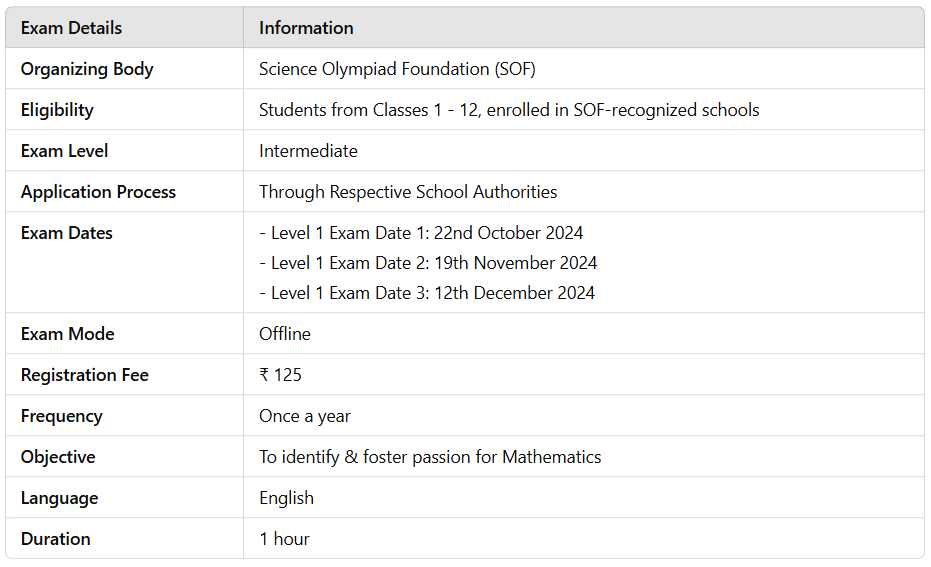How to Prepare for Class 1 Science Olympiad? | Science Olympiad for Class 1 PDF Download
| Table of contents |

|
| SOF (NSO) Exam Overview |

|
| SOF (NSO) Exam Pattern & Syllabus |

|
| How to Prepare for the SOF (NSO) Exam (Easy & Fun Guide!) |

|
| Final Tips for Success |

|
SOF (NSO) Exam Overview
The National Science Olympiad (SOF NSO) is a yearly academic contest conducted by the Science Olympiad Foundation (SOF) for students from classes 1 to 12. It aims to evaluate their reasoning and logical abilities.

The table below covers important details about the SOF National Science Olympiad (NSO) exam.

SOF (NSO) Exam Pattern & Syllabus
The SOF National Science Olympiad (NSO) exam pattern consists of multiple-choice questions and problem-solving tasks to assess understanding of scientific aptitude.

- The syllabus for NSO level 1 and 2 covers a variety of topics.
- Participants must apply theoretical knowledge to solve real-world problems and think critically about complex problems.
- For classes 1st to 4th, there are 35 questions worth a total of 40 marks, while for classes 5th to 12th, there are 50 questions worth a total of 60 marks.
- Following the protocol of NEP (2020), NCF (2023), NCERT and CBSE guidelines, National and various State Boards for the convenience of schools and students, any change/reduction in the syllabi will be reflected in actual question papers.
Here is a well-structured and visually clear table for the SOF NSO Exam Pattern:
Section – 1 : Patterns, Odd One Out, Measuring Units, Geometrical Shapes, Spatial Understanding, Grouping, Analogy, Ranking Test, Problems based on Figures.
Section – 2 : Living and Non-living Things, Plants, Animals, Human Beings and Their Needs, Good Habits and Safety Rules, Air and Water, Weather and The Sky.
Section – 3 : Higher Order Thinking Questions - Syllabus as per Section – 2.
How to Prepare for the SOF (NSO) Exam (Easy & Fun Guide!)
Getting ready for the SOF NSO Exam? Don't worry! Follow these simple steps to prepare easily and smartly.

1. Understand the Syllabus
Before starting, check the syllabus for the Science Olympiad. It usually includes topics like:
Living and non-living things
Plants and animals
Our body and senses
Food and nutrition
Weather and seasons
Basic environmental science
Make a list of the topics and create a study plan.
2. Be a Nature Detective
Observing nature is a fun way to learn science!

Look at plants, insects, and birds in your garden or park.
Ask: “Why do leaves change colour?” or “How do ants walk in lines?”
Collect safe objects like leaves, pebbles, or flowers (ask a grown-up first!).
3. Learn About Animals and Plants
Watch fun videos or read books about:

Animals: What they eat, where they live.
Plants: Parts of a plant (roots, stem, leaves).
Play “Guess the Animal”: Describe an animal (e.g., “I have stripes and live in the jungle”) and let others guess!
4. Create a Study Schedule
To prepare well, it is important to have a study routine:
Allocate time each day for science.
Use books, videos, and practice tests to learn.
Revise regularly to remember important concepts.
5. Practice Regularly
Solve simple science questions every day.
Work on previous years’ Olympiad question papers.
Use interactive activities like quizzes and puzzles to make learning fun.

6. Focus on Understanding Concepts
Science Olympiads test thinking skills, not just memorisation. To understand concepts better:
Think about why things happen, rather than just remembering facts.
Use examples from real life to explain concepts.
Relate topics to everyday experiences.

7. Take Mock Tests and Sample Papers
Practice with NSO sample papers to understand the exam format.
Solve at least one paper each day and analyze your performance.
Mock tests will help improve time management and confidence.
8. Seek Guidance
If you need help, ask your teachers, parents, or online tutors. They can explain tricky concepts and guide you on how to study effectively.
Final Tips for Success

- Revise formulas and shortcuts regularly.
- Solve problems step by step to avoid silly mistakes.
- Stay calm and confident during the exam.
- Most important – Have fun while learning.
Ready? Go and Rock the Exam!
Follow these steps, practice daily, and you will do great in the SOF NSO exam.
By following these steps, you can prepare well for the Class 1 Science Olympiad and develop a love for learning science!
|
33 videos|90 docs|61 tests
|
FAQs on How to Prepare for Class 1 Science Olympiad? - Science Olympiad for Class 1
| 1. What topics are covered in the Class 1 Science Olympiad exam? |  |
| 2. How can I help my child prepare for the Class 1 Science Olympiad? |  |
| 3. Are there any specific study materials recommended for Class 1 Science Olympiad preparation? |  |
| 4. What is the format of the Class 1 Science Olympiad exam? |  |
| 5. How can I track my child's progress while preparing for the Class 1 Science Olympiad? |  |




















